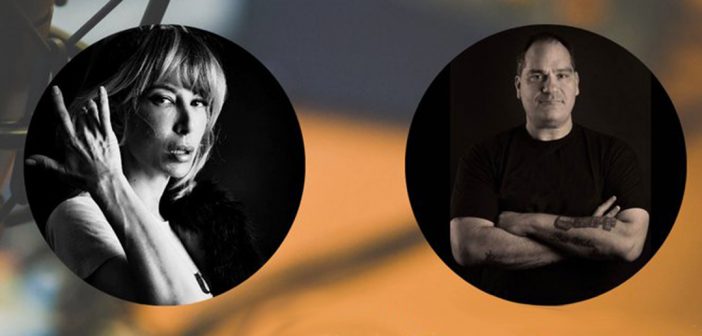In a conversation on Zoom, author Amy Dresner and clinical social worker Joe Schrank, hosts of the podcast “Rehab Confidential,” held a conversation on addiction, the uptick in substance use during the pandemic, and how social workers can help—now and in the future. The exchange, held on Nov. 5, was sponsored by the Graduate School of Social Service with several GSS students tuning in. Assistant Professor Sameena Azhar, Ph.D., moderated the dialogue in conjunction with a class she teaches on substance abuse treatment—a subject she has researched extensively.
“The true fallout to whatever this pandemic has done remains to be seen, but we do know that substance abuse and suicidal ideation have increased,” said Azhar. “We’re self-isolating for longer periods of time and it’s a lot easier to hide your substance misuse, because nobody is looking and everybody is in the same boat of working online.”
Dresner, a former comedian and author of My Fair Junkie: A Memoir of Getting Dirty and Staying Clean (Hachette, 2017), grew up in tony Beverly Hills only to find herself homeless and sweeping up used syringes on Hollywood Boulevard as part of a court-ordered punishment for a domestic violence violation spurred on by her addiction. She has been clean and sober for eight years. Schrank is a Jesuit-educated social worker based out of Los Angeles who liberally peppers his speech with Latin whenever the opportunity presents itself, in particular, cura personalis. He’s been sober for more than 20 years. The two podcasters helped promote the event, which was open to all.
A Growing Online Recovery Community
Azhar noted that most recovery meetings have had to move online to a virtual space. But well before the pandemic there was already a growing digital recovery community, including a thriving scene of bloggers, social media influencers, and podcasters like Dresner and Schrank.
As people continue to cope with the stress of being cooped up at home, there has been a well-documented uptick in substance abuse, making the digital community all the more important because it’s accessible to anyone with a smartphone or computer, Azhar said. She organized the event because she wanted to familiarize GSS students with the burgeoning digital scene.
‘Mommy Drinking’ and More
Azhar asked the hosts what they were seeing on the ground in Los Angeles. In particular, she wanted to know whether people who did not have a prior substance issue are prone to developing one in response to the trauma of the pandemic, social unrest, and the continuous onslaught of negative news.
“Among my friends that are normies [i.e. sober] we know that people are eating more, we know that people are drinking more, we know that they’re drinking during the day, that there’s ‘mommy drinking.’ Drug use has gone up. Porn has gone up,” said Dresner. “Whether these people will come out of the pandemic and have an addiction, I don’t know. Can you drink yourself into having alcoholism? Sure. Just like you can get addicted to pain pills if you take them for too long. You’ll have a physical addiction, whether or not you have a psychological addiction.”
Schrank said that there are few absolutes when it comes to addiction, except for the dangers of being idle and alone.
“We know those are absolutes for any mental health issues, like anxiety, depression, substance misuse,” said Schrank. “So, do something,” he advised, “and do it with somebody—even if online.”
He recalled a recent incident at the supermarket that he feared was becoming all too common. He observed a young person in line with a jar of peanut butter, a loaf of bread, and a bottle of vodka.
“I said, ‘Are those your groceries?’ And he was like, ‘I know.’”
Schrank concurred with Azhar that the mental health issues related to the pandemic are only beginning to surface.
“I think that a lot of people are hiding out. So, if you just have to get on Zoom for 15 minutes with your boss a day, and then back to the couch in your jammies with your peanut butter and bottle of vodka, that’s not going to help,” he said.
Social Workers Can Make a Difference
Azhar said that there are many telehealth options that people could consider when seeking help for a growing problem, but she was also careful to underscore that in-person therapy will remain extremely important in the post-pandemic world. Whether online or in-person, the need for social workers will only grow in the coming years, she said.
Yet some social workers are feeling despondent, she noted, unsure if they can make a difference as the crisis grows. In the chat, one student questioned whether social workers could still have an impact as “lowly clinicians, nurses, counselors.”
Dresner cited her own experience as proof that they do make a difference.
“I’ve been in quite a few treatment centers and the way that you treat… I’m going to cry,” she said, collecting herself before continuing. “A lot of them were like, ‘Here’s your crazy pills.’ And I was like, ‘Okay, that’s not very cool.’ But there was one [nurse]who looked at me and treated me … with dignity and saw me like the person I could become. When I came out of that extraordinarily depressive, alcoholic, self-destructive place—I thanked him.”



